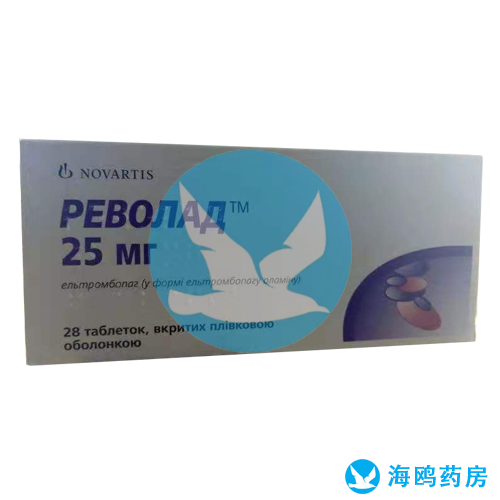
Revolade
Novartis, Switzerland
$450.00-
SelectSpecification/Number
-
ParameterDetailed information
-
NoticeCustoms clearance instructions
-
Required readingConsumption notice
- Description
- Information
INDICATIONS AND USAGE(适应症)
Treatment of Thrombocytopenia in Patients With Persistent or Chronic Immune Thrombocytopenia
PROMACTA is indicated for the treatment of thrombocytopenia in adult and pediatric patients 1 year and older with persistent or chronic immune thrombocytopenia (ITP) who have had an insufficient response to corticosteroids, immunoglobulins, or splenectomy. PROMACTA should be used only in patients with ITP whose degree of thrombocytopenia and clinical condition increase the risk for bleeding.
Treatment of Thrombocytopenia in Patients With Hepatitis C Infection
PROMACTA is indicated for the treatment of thrombocytopenia in patients with chronic hepatitis C to allow the initiation and maintenance of interferon-based therapy. PROMACTA should be used only in patients with chronic hepatitis C whose degree of thrombocytopenia prevents the initiation of interferon-based therapy or limits the ability to maintain interferon-based therapy.
Treatment of Severe Aplastic Anemia
PROMACTA is indicated in combination with standard immunosuppressive therapy (IST) for the first-line treatment of adult and pediatric patients 2 years and older with severe aplastic anemia.
PROMACTA is indicated for the treatment of patients with severe aplastic anemia who have had an insufficient response to immunosuppressive therapy.
DOSAGE(服用剂量)
Persistent or Chronic Immune Thrombocytopenia
Use the lowest dose of PROMACTA to achieve and maintain a platelet count greater than or equal to 50 x 109/L as necessary to reduce the risk for bleeding. Dose adjustments are based upon the platelet count response. Do not use PROMACTA to normalize platelet counts [see Warnings and Precautions (5.4)]. In clinical trials, platelet counts generally increased within 1 to 2 weeks after starting PROMACTA and decreased within 1 to 2 weeks after discontinuing PROMACTA.
Initial Dose Regimen: Adult and Pediatric Patients 6 Years and Older with ITP: Initiate PROMACTA at a dose of 50 mg once daily, except in patients who are of East-/Southeast-Asian ancestry or who have mild to severe hepatic impairment (Child-Pugh Class A, B, C).
For patients of East-/Southeast-Asian ancestry with ITP, initiate PROMACTA at a reduced dose of 25 mg once daily.
For patients with ITP and mild, moderate, or severe hepatic impairment (Child-Pugh Class A, B, C), initiate PROMACTA at a reduced dose of 25 mg once daily.
For patients of East-/Southeast-Asian ancestry with ITP and hepatic impairment (Child-Pugh Class A, B, C), consider initiating PROMACTA at a reduced dose of 12.5 mg once daily.
Pediatric Patients with ITP Aged 1 to 5 Years: Initiate PROMACTA at a dose of 25 mg once daily.
Chronic Hepatitis C-Associated Thrombocytopenia
Use the lowest dose of PROMACTA to achieve and maintain a platelet count necessary to initiate and maintain antiviral therapy with pegylated interferon and ribavirin. Dose adjustments are based upon the platelet count response. Do not use PROMACTA to normalize platelet counts. In clinical trials, platelet counts generally began to rise within the first week of treatment with PROMACTA.
Refractory Severe Aplastic Anemia
Use the lowest dose of PROMACTA to achieve and maintain a hematologic response. Dose adjustments are based upon the platelet count. Hematologic response requires dose titration, generally up to 150 mg, and may take up to 16 weeks after starting PROMACTA.
Initial Dose Regimen: Initiate PROMACTA at a dose of 50 mg once daily.
For patients with severe aplastic anemia of East-/Southeast-Asian ancestry or those with mild, moderate, or severe hepatic impairment (Child-Pugh Class A, B, C), initiate PROMACTA at a reduced dose of 25 mg once daily.
Initial Dose Regimen: Initiate PROMACTA at a dose of 25 mg once daily.
ADVERSE REACTIONS(不良反应)
Hepatic Decompensation in Patients with Chronic Hepatitis C
Hepatotoxicity
Increased Risk of Death and Progression of Myelodysplastic Syndromes to Acute Myeloid Leukemia
Thrombotic/Thromboembolic Complications
Cataracts
For full information, please refer to:
https://nctr-crs.fda.gov/fdalabel/services/spl/set-ids/7714a0ed-34bb-46e6-a0a5-b363908b22c2/spl-doc?hl=Eltrombopag
Revoladeinformation
No information yet!!!